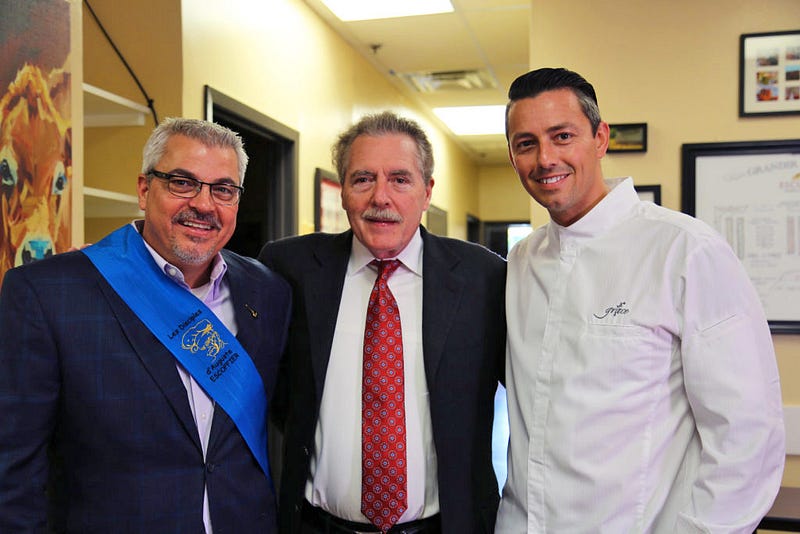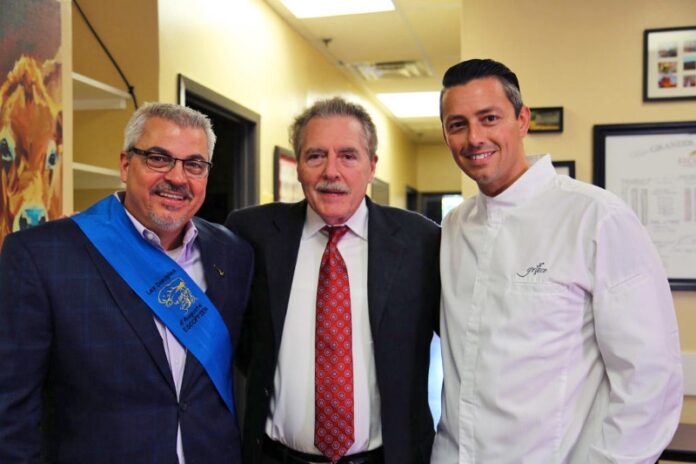Social Impact Heroes: Marcus McMellon of Auguste Escoffier School of Culinary Arts is helping returning veterans to assimilate back into society

We help students master skills that will make them employable for a lifetime. It is well documented that the United States has a shortage of qualified chefs and our graduates help to fill this gap. Second, we help returning veterans to assimilate back into society. I read an article the other day that veterans relate better than other students to the structure of a well-run kitchen. Auguste Escoffier created the brigade system for kitchen management in the late 1800’s based on the military’s command structure. Finally, Escoffier teaches students about the Farm-to-Table movement and the importance of understanding where your food comes from and the people who grow the food we eat. Our students work with local family farmers and learn about what crops grow in which seasons and gain an appreciation of the economics of growing food for others.
I had the pleasure to interview Marcus McMellon, president of Auguste Escoffier School of Culinary Arts in Austin, Texas. Marcus is a graduate of the University of Texas at Austin where he received a BBA in Accounting. He is also a Certified Public Accountant. McMellon has more than 30 years of finance and operations experience with the last 18 years being in career-focused education. Marcus has served on the board of directors for Career Colleges and Schools of Texas for more than 15 years.
Thank you so much for doing this with us! Can you tell us a story about what brought you to this specific career path?
Since my first paying job in a restaurant while in high school, I have always been drawn to the “controlled chaos” of restaurant kitchens and the teamwork necessary to deliver a fine dining experience. After spending a number of years in the financial services industry, I had the opportunity to join a culinary school as Vice President of Finance and Operations. This was the perfect vehicle for me to utilize my education and be involved with the food service industry that I loved. That transition into career focused education has opened up many fantastic opportunities including my current role with the Escoffier schools.
Can you share the most interesting story that happened to you since you began leading your company?
Not sure I can pick just one. If I had to go a route, I’d say I’ve been blessed to meet so many industry giants in my years with Escoffier. I had a one-on-one breakfast with Jeremiah Tower where he told me about the beginnings of farm-to-table cuisine. Curtis Duffy has visited the campus a couple times, and it’s always amazing to hear his story. And Michel Escoffier, the great grandson of Auguste Escoffier, visits the campus about once per year. I love spending time with him and hearing stories from Auguste’s memoirs no one else knows.
But we host a number of events here on campus throughout the year or lend our kitchens to events that need the cooking space. Our students have cooked alongside some of the hottest celebrity chefs right now. That’s always an honor.
Can you share a story about the funniest mistake you made when you were first starting? Can you tell us what lesson you learned from that?
In the beginning everyone makes lots of mistakes. I was no exception. Let’s just say it’s taken a lot of elbow grease to get where we are and I am today. The important thing to remember is to make sure to do self-evaluation and learn from those mistakes.
Can you describe how your organization is making a significant social impact?
First, we help students master skills that will make them employable for a lifetime. It is well documented that the United States has a shortage of qualified chefs and our graduates help to fill this gap. Second, we help returning veterans to assimilate back into society. I read an article the other day that veterans relate better than other students to the structure of a well-run kitchen. Auguste Escoffier created the brigade system for kitchen management in the late 1800’s based on the military’s command structure. Finally, Escoffier teaches students about the Farm-to-Table movement and the importance of understanding where your food comes from and the people who grow the food we eat. Our students work with local family farmers and learn about what crops grow in which seasons and gain an appreciation of the economics of growing food for others.

Wow! Can you tell me a story about a particular individual who was impacted by this cause?
Well, to speak to one of those talking points. Travis Hawthorn is a United States Marine Corps veteran who enrolled in our culinary program. After 14 years in the military, he retired and said the only other thing he liked doing was cooking. He was a stellar student and went on to be a high school presenter for the school and promoter of the school to other vets. During his time as a student, Travis actually got to work on an episode of Restaurant Impossible with Robert Irvine. He is now heading up the culinary program at a local high school.
Are there three things the community/society/politicians can do help you address the root of the problem you are trying to solve?
Yeah, there are two.
Embrace the concept of Proprietary Career Education. We can give more individualized attention to our students and then help place them on their career paths with superior Career Services.
We also need to pass legislation to help more people become family farmers — the family farmer is becoming extinct. We’re losing a big part of our culture as family farms disappear. By promoting and supporting small farms, we’re not only saving the purity of our products but also helping local economies and the environment.
How do you define “Leadership”? Can you explain what you mean or give an example?
Leadership is all about trust and courage. You must trust that you know the best way to move forward and have the courage to act when others don’t. You develop trust in yourself by accumulating experiences (both positive and negative). If you try something and fail, you learn from that experience. You develop courage by continuing to risk failure for the sake of gaining more experiences.
What are your “5 things I wish someone told me when I first started” and why. Please share a story or example for each.
Don’t beat yourself up too much over failures. It’s how we bounce back and what we take away that matters.
Trust is earned, not just given.
Teams take time to build, but it’s worth the growing pains.
The most important part of any education institution is the student and their success. Everything else follows.
Success is achieved through incremental improvements. Don’t always try to hit a home run, just try to be better today than you were yesterday and before you know it you will have gone far.
You are a person of enormous influence. If you could inspire a movement that would bring the most amount of good to the most amount of people, what would that be? You never know what your idea can trigger. 🙂
Local food sourcing is a big passion of mine. It’s fresher, better tasting, and healthier. I’ve lived in Austin a long time, and the “Keep Austin Weird” mantra is alive and well. We work hard to support local businesses and maintain the charm of this city.
Can you please give us your favorite “Life Lesson Quote”? Can you share how that was relevant to you in your life?
Yogi Berra once said, “It ain’t over till it’s over.” That’s a great attitude to have. Don’t give up if things don’t go your way. I’ve had several times in my life where I felt like quitting something because, for the moment, things weren’t going my way. Perseverance is powerful. That’s the message I give to students who feel like school is too hard and want to quit. The ones who fight through it come out ten times stronger on the other side.
Is there a person in the world, or in the US whom you would love to have a private breakfast or lunch with, and why? He or she might just see this, especially if we tag them. 🙂
I’ve been lucky enough to wine and dine with some of the world’s best chefs. There’s a certain charm about enjoying a meal with a chef. So, if I had to pick one person I would probably say Auguste Escoffier. Yes, he was a chef. But he was really an innovator and artist. I would love to hear his stories from his time at The Savoy preparing meals for celebrities and royalty.
How can our readers follow you on social media?
We have Facebook, Twitter and Instagram! Initiatives I’m involved with and campus activities can be found there.
This was very meaningful, thank you so much!
It was my pleasure. Thank you.


